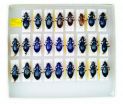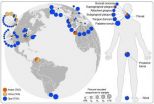(Press-News.org) PHILADELPHIA— In the largest group of results to date, researchers from Penn Medicine's Abramson Cancer Center and other institutions have shown in clinical trials that the malaria drug hydroxychloroquine (HCQ) blocked autophagy in a host of aggressive cancers—glioblastoma, melanoma, lymphoma and myeloma, renal and colon cancers—and in some cases helped stabilize disease. Autophagy—an essential process cancer cells need to fuel their growth—is a key troublemaker spurring tumor growth. Block this pathway, many preclinical studies suggest, and anti-cancer agents such as chemotherapy and radiation therapy will be able to do their job better.
Results of six trials—five in humans (with over 200 patients) and one in dogs—are all reported in the May online issue of Autophagy, and will be presented at the Keystone Symposia on Autophagy in Austin, Texas, on Monday, May 26, by author Ravi K. Amaravadi, MD, assistant professor of Medicine in the division of Hematology/Oncology at the Perelman School of Medicine and co-leader of the Cancer Therapeutics Program at Penn Medicine's Abramson Cancer Center, who was the principal investigator on four of the six trials, which included a multi-disciplinary team of investigators at Penn Medicine and other institutions treating a wide range of cancers.
"There are currently over 40 clinical trials involving HCQ as a potential autophagy inhibitor worldwide, and the results of our trials are among the first to be published," said Amaravadi. "These studies provide promising evidence that autophagy blockade can be achieved, and that combining autophagy inhibitors with other cancer therapies in very sick patients can be accomplished safely in most cases. We wanted to present the data for all of these trials at one time, because when presented side by side, a more comprehensive and synergistic understanding of the potential of blocking this pathway emerges."
The phase I and phase I/II trials aimed to measure the safety of adding HCQ to either chemotherapy, radiation therapy or targeted therapies, its effectiveness at inhibiting autophagy, and the potential clinical benefit of HCQ combination therapies.
In melanoma, researchers observed prolonged stable disease in 20 percent of the patients on temozolomide. While in another trial, researchers observed stable disease in 75 percent of patients with metastatic melanoma on temsirolimus. In the dog clinical trial, all 30 dogs with non-Hodgkin's lymphoma treated with HCQ and the standard chemotherapy doxorubicin had clinical benefit, and nine had complete remission.
Autophagy is a relatively new target in cancer, infectious disease and neurodegenerative disorders, and while advances in the fundamental understanding of autophagy are increasing at a breakneck speed, translation of these advances into clinical trials and clinical benefit has been lagging. More recently, HCQ has shown promise in treating pancreatic cancer patients in ongoing clinical trials; however, its tolerability and effectiveness to stop autophagy in humans with other cancers has not been shown before.
The following is a brief summary of each of the six clinical trials, which can be found here.
Trial #1: A phase I/II trial of HCQ in conjunction with radiation therapy and concurrent and adjuvant temozolomide in patients with newly diagnosed glioblastoma multiforme
These data from a national trial with 92 glioblastoma patients established that autophagy inhibition is achievable with HCQ; however, toxicity prevented escalation to higher doses. Therefore, a definitive test of the role of autophagy inhibition in the adjuvant setting for glioma patients awaits the development of lower-toxicity compounds for optimal inhibition. No significant improvement in overall survival was observed.
Trial #2: Phase I trial of HCQ with dose-intense temozolomide in patients with advanced solid tumors and melanoma
A trial with 40 patients (73 percent with metastatic melanoma) showed that high-dose HCQ and the oral chemotherapy drug temozolomide is safe and tolerable, and is associated with autophagy inhibition. Prolonged stable disease and responses observed in about 20 percent of the patients suggests antitumor activity.
Trial #3: Combined autophagy and proteasome inhibition: A phase 1 trial of HCQ and bortezomib in patients with relapsed/refractory myeloma
A phase I trial with 25 patients combining bortezomib and HCQ for relapsed or refractory myeloma achieved autophagy inhibition and was tolerated. Of 22 patients evaluable for response, 3 (14 percent) had very good partial responses, 3 (14 percent) had minor responses, and 10 (45 percent) had a period of stable disease.
Trial #4: Combined mTOR and autophagy inhibition: Phase I trial of HCQ and temsirolimus in patients with advanced solid tumors and melanoma
This study of 27 patients indicates that temsirolimus, an mTOR inhibitor, and HCQ is safe and tolerable, blocks autophagy, and had significant antitumor activity; researchers observed stable disease in 75 percent of those patients with metastatic melanoma.
Trial #5: Combined autophagy and HDAC inhibition: A phase I safety, tolerability, pharmacokinetic, and pharmacodynamic analysis of HCQ in combination with the HDAC inhibitor vorinostat in patients with advanced solid tumor.
A phase I clinical trial conducted by investigators at the University of Texas San Antonio, showed that the combination of HCQ and the chemotherapy drug vorinostat in 27 patients with advanced solid tumors, including renal cell carcinoma and colon cancer, was clinically safe and inhibited autophagy. What's more, one patient who had failed multiple prior treatments for renal cell carcinoma had a confirmed durable partial response and two patients with colorectal cancer had prolonged stable disease.
Trial #6: Phase I clinical trial and pharmacodynamic evaluation of combination HCQ and doxorubicin treatment in pet dogs treated for spontaneously occurring lymphoma
A phase I trial conducted by investigators at the Colorado State University Veterinary School in 30 dogs with non-Hodgkin's lymphoma with HCQ and the standard chemotherapy doxorubicin (DOX) showed a 100 percent clinical benefit rate. Nine of the dogs had complete remission. These results are encouraging given that reported response rates with DOX alone for treatment-naive lymphoma in dogs range from 60-85 percent. The tissue samples provided by the dogs provided valuable information about HCQ pharmacology and demonstrated that clinical trials in dogs can not only benefit pets, but can advance scientific knowledge.
"The promising safety results of these early trials set the stage for additional HCQ trials in different cancers, and trials involving new autophagy inhibitors that are being developed by pharmaceutical companies," said Amaravadi. "However, more work needs to be done before we can declare HCQ as a viable and cost-effective drug to help improve the efficacy of certain anti-cancer agents for the treatment of many cancers.
"If we can find the type of cancer patients for whom this approach works best, it could have a huge impact for global cancer care. In the meanwhile, cancer patients should only be treated with new HCQ combinations in the setting of a clinical trial."
INFORMATION:
Other institutions involved in the study include University of the Sciences, University of Texas San Antonio, Johns Hopkins University, Case Comprehensive Cancer Center, Dana-Farber/Harvard Cancer Center, Henry Ford Hospital , University of Alabama at Birmingham, University of California, San Francisco, Wake Forest University, University of Colorado –Aurora and Colorado State University-Fort Collins, CO.
Clinical trials designed to block autophagy in multiple cancers show promise
Physician from Penn's Abramson Cancer Center leads clinical efforts to manipulate a new drug pathway in cancer patients
2014-05-22
ELSE PRESS RELEASES FROM THIS DATE:
Yale Cancer Center studies find lifestyle changes improve biomarkers for breast cancer recurrence and mortality
2014-05-22
New Haven, CT – A pair of Yale Cancer Center interventional studies involving breast cancer survivors found that lifestyle changes in the form of healthy eating and regular exercise can decrease biomarkers related to breast cancer recurrence and mortality. The abstracts are scheduled to be presented at the 2014 annual meeting of the American Society of Clinical Oncology in Chicago May 30-June 3rd.
"The findings of both studies support a growing body of research that suggests lifestyle interventions lower biomarkers associated with breast cancer recurrence and mortality, ...
Repeated sexual assault victims report more psychological problems than previously thought
2014-05-22
COLUMBIA, Mo. – According to recent studies, one in five adult women and one in 100 adult men have reported being raped. The prevalence increases to two in five among women and one in five among men who report experiencing other forms of sexual violence, such as repeated unwanted sexual contact and sexual coercion. Now, researchers at the University of Missouri have determined that those victims who are repeatedly assaulted, but not necessarily violently raped, show greater levels of psycho-behavioral consequences than earlier thought. The researchers suggest that understanding ...
Male and female sex cell determination requires lifelong maintenance and protection
2014-05-22
MINNEAPOLIS/ST. PAUL (May 22, 2014) – The way in which the sex of an organism is determined may require lifelong maintenance, finds new research from the University of Minnesota. According to the study published today in the journal Developmental Cell, sex-specific transcription factors perform lifelong work to maintain sexual determination and protect against reprogramming of cells from one sex to the other.
Previous research at the University of Minnesota's Department of Genetics, Cell Biology, and Development showed sex determination is not permanent. Using a mouse ...
Study shows how common obesity gene contributes to weight gain
2014-05-22
NEW YORK, NY (May 22, 2014) — Researchers have discovered how a gene commonly linked to obesity—FTO—contributes to weight gain. The study shows that variations in FTO indirectly affect the function of the primary cilium, a little-understood hair-like appendage on brain and other cells. Specific abnormalities of cilium molecules, in turn, increase body weight, in some instances, by affecting the function of receptors for leptin, a hormone that suppresses appetite. The findings, made in mice, suggest that it might be possible to modify obesity through interventions that alter ...
Scientific collections play vital role in conservation biology
2014-05-22
Scientists from the California Academy of Sciences and more than 60 other international research institutions spanning six continents have responded to a recent paper in Science, which questioned current methods of scientific collecting and advocated the use of non-lethal alternatives. The response, led by Luiz Rocha, Ph.D., the Academy's Assistant Curator and Follett Chair of Ichthyology, and co-authored by such science luminaries as Harvard's E. O. Wilson and the Academy's Chief of Science and Sustainability, Margaret (Meg) Lowman, describes in detail the value that scientific ...
A glimpse into nature's looking glass -- to find the genetic code is reassigned
2014-05-22
In the Lewis Carroll classic, Through the Looking Glass, Humpty Dumpty states, "When I use a word, it means just what I choose it to mean—neither more nor less." In turn, Alice (of Wonderland fame) says, "The question is, whether you can make words mean so many different things." All organisms on Earth use a genetic code, which is the language in which the building plans for proteins are specified in their DNA. It has long been assumed that there is only one such "canonical" code, so each word means the same thing to every organism. While a few examples of organisms ...
RI Hospital researcher and colleagues discover protein that may lead to malaria vaccine
2014-05-22
VIDEO:
Jonathan Kurtis, M.D., Ph.D., director of the Center for International Health Research at Rhode Island Hospital, talks about the latest findings in their research to find a vaccine for malaria,...
Click here for more information.
PROVIDENCE, R.I. – Rhode Island Hospital researchers have discovered a protein that is essential for malaria-causing parasites to escape from inside red blood cells. Antibodies to this protein trap the parasite inside these red blood cells. This ...
Growing inequalities make science more of a 'winner takes all' field
2014-05-22
ANN ARBOR—As new research documents growing inequalities in health and wealth, the gap between "haves" and "have-nots" is growing in the field of scientific research itself, says University of Michigan sociologist Yu Xie.
"It's surprising that more attention has not been paid to the large, changing inequalities in the world of scientific research, given the preoccupation with rising social and economic inequality in many countries," said Xie, research professor at the U-M Institute for Social Research and professor of sociology, statistics and public policy.
The forces ...
Fruit flies show mark of intelligence in thinking before they act
2014-05-22
Fruit flies 'think' before they act, a study by researchers from the University of Oxford's Centre for Neural Circuits and Behaviour suggests. The neuroscientists showed that fruit flies take longer to make more difficult decisions.
In experiments asking fruit flies to distinguish between ever closer concentrations of an odour, the researchers found that the flies don't act instinctively or impulsively. Instead they appear to accumulate information before committing to a choice.
Gathering information before making a decision has been considered a sign of higher intelligence, ...
Collecting biological specimens essential to science and conservation
2014-05-22
ANN ARBOR—Collecting plant and animal specimens is essential for scientific studies and conservation and does not, as some critics of the practice have suggested, play a significant role in species extinctions.
Those are the conclusions of more than 100 biologists and biodiversity researchers who signed a letter to the journal Science scheduled for online publication May 22.
The letter is a response to an April 18 Perspectives article in Science arguing that alternative methods of documentation—such as high-resolution photography, audio recordings and nonlethal tissue ...
LAST 30 PRESS RELEASES:
Novel camel antimicrobial peptides show promise against drug-resistant bacteria
Scientists discover why we know when to stop scratching an itch
A hidden reason inner ear cells die – and what it means for preventing hearing loss
Researchers discover how tuberculosis bacteria use a “stealth” mechanism to evade the immune system
New microscopy technique lets scientists see cells in unprecedented detail and color
Sometimes less is more: Scientists rethink how to pack medicine into tiny delivery capsules
Scientists build low-cost microscope to study living cells in zero gravity
The Biophysical Journal names Denis V. Titov the 2025 Paper of the Year-Early Career Investigator awardee
Scientists show how your body senses cold—and why menthol feels cool
Scientists deliver new molecule for getting DNA into cells
Study reveals insights about brain regions linked to OCD, informing potential treatments
Does ocean saltiness influence El Niño?
2026 Young Investigators: ONR celebrates new talent tackling warfighter challenges
Genetics help explain who gets the ‘telltale tingle’ from music, art and literature
Many Americans misunderstand medical aid in dying laws
Researchers publish landmark infectious disease study in ‘Science’
New NSF award supports innovative role-playing game approach to strengthening research security in academia
Kumar named to ACMA Emerging Leaders Program for 2026
AI language models could transform aquatic environmental risk assessment
New isotope tools reveal hidden pathways reshaping the global nitrogen cycle
Study reveals how antibiotic structure controls removal from water using biochar
Why chronic pain lasts longer in women: Immune cells offer clues
Toxic exposure creates epigenetic disease risk over 20 generations
More time spent on social media linked to steroid use intentions among boys and men
New study suggests a “kick it while it’s down” approach to cancer treatment could improve cure rates
Milken Institute, Ann Theodore Foundation launch new grant to support clinical trial for potential sarcoidosis treatment
New strategies boost effectiveness of CAR-NK therapy against cancer
Study: Adolescent cannabis use linked to doubling risk of psychotic and bipolar disorders
Invisible harms: drug-related deaths spike after hurricanes and tropical storms
Adolescent cannabis use and risk of psychotic, bipolar, depressive, and anxiety disorders
[Press-News.org] Clinical trials designed to block autophagy in multiple cancers show promisePhysician from Penn's Abramson Cancer Center leads clinical efforts to manipulate a new drug pathway in cancer patients



